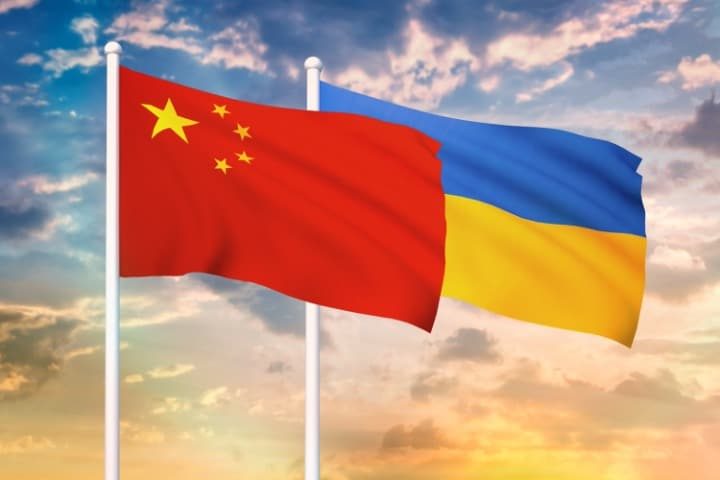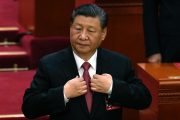
SINGAPORE — On April 26, Chinese leader Xi Jinping engaged in a phone call with his Ukrainian counterpart Volodymyr Zelensky for the first time since the onset of the Russo-Ukraine conflict that erupted in February last year.
The call fulfilled a major goal of Kyiv, which had publicly called for such talks for months. During the conversation, Zelensky, who is currently facing allegations of embezzling Western aid money, reiterated the necessity of cultivating closer ties with China by nominating a former Cabinet minister as Ukraine’s new ambassador to Beijing.
Portraying his talk with Xi as “long and meaningful,” Zelensky tweeted, “I believe that this call, as well as the appointment of Ukraine’s ambassador to China, will give a powerful impetus to the development of our bilateral relations.”
On his end, Xi told Zelensky that China would deploy special representatives to Ukraine and conduct peace talks, Chinese state media stated.
As the most influential world leader to have avoided decrying Russian actions in Ukraine, Xi had made a state visit to Moscow in March this year and has been advocating for a 12-point peace plan for Ukraine. Western nations have regarded Xi’s so-called peace plan with skepticism, stating that the proposal is too ambiguous and does not provide a concrete solution to the conflict. These skeptics further contend that the plan could be leveraged by Russian President Vladimir Putin to call for a truce that would leave Russian forces in charge of occupied territory while they regroup. However, Kyiv lauded the plan as an indication of Chinese interest in brokering peace with Russia.
China will concentrate on emphasizing peace talks leading to a ceasefire as soon as possible, Chinese state media cited Xi as telling Zelensky. “As a permanent member of the UN Security Council and a responsible major country, we will neither sit idly by, nor pour oil on fire, nor seek to profit from it,” Xi said.
Beijing has maintained that it is in a good position to mediate the conflict, as it has not openly taken sides with either Russia or Ukraine. “What China has done to help resolve the Ukraine crisis has been above board,” claimed Yu Jun, deputy head of the Foreign Ministry’s Eurasian department.
Although Washington lauded Xi’s call with Zelensky, of which it claimed it had no prior knowledge, it asserted that it was too soon for the Sino-Ukraine phone call to result in a peace deal.
“That’s a good thing,” White House national security spokesman John Kirby said. “Now, whether that’s going to lead to some sort of meaningful peace movement, or plan, or proposal, I just don’t think we know that right now.”
With Ukraine ramping up its military to unveil a counteroffensive against Russia in the coming weeks or months, peace talks seem highly unlikely. Kyiv has been insisting that Moscow back out of Ukraine, while the Kremlin insists that Kyiv acknowledge Russian claims to certain territories, such as Crimea.
Weeks before the outbreak of the Ukraine conflict, Xi and Russian President Vladimir Putin had inked a “no limits” partnership agreement.
China has lambasted Western sanctions against Moscow, but has refrained from openly backing Russian efforts in Ukraine. China has also become Russia’s biggest economic partner, often purchasing at huge discounts oil that can no longer be officially sold in Europe.
After the Xi-Zelensky talks, Russia’s Foreign Ministry spokesman Maria Zakharova said, “We note the readiness of the Chinese side to make efforts to establish a negotiation process.”
Earlier this week, European countries slammed statements made by China’s ambassador to France that states such as Ukraine “don’t have actual status in international law” after the collapse of the Soviet Union. Addressing Western criticism, Beijing reinforced that its stance on the independence of former Soviet states remained unchanged.
Previously, Brazilian President Luiz Inácio Lula da Silva had blasted Washington for “encouraging” the Ukraine conflict, pointing out that the United States and European Union (EU) “need to start talking about peace.”
Perhaps even more significantly, Zelensky’s top advisor, Mykhailo Podolyak, accused America of being responsible for Ukraine’s conflict with Russia, lauding a “Ukrainian victory” resolution mooted by U.S. lawmakers on April 26. Washington, Podolyak posited, hopes to make reparation for a “historical mistake” by endorsing Kyiv’s efforts in the conflict and seeking to include Kyiv in war alliance NATO.
“The House of Representatives’ resolution is unequivocal: The United States, unfortunately, along with other Western countries, encouraged Ukraine to give up nuclear and other weapons to ensure security and stability in the region under safeguards. This was a wrong policy that was misinterpreted by the aggressor and led to a major war in Europe,” Podolyak posted on Twitter.
Kyiv has been asserting for years that America has a duty to defend it from Moscow, since Ukraine had returned atomic weapons to Moscow under the 1994 Budapest Memorandum in exchange for guarantees of territorial integrity. In an interview with Irish broadcaster RTE earlier this month, former U.S. Democratic President Bill Clinton expressed American regrets about convincing Ukraine to give up nuclear weapons.
Moscow has insisted that the nuclear arsenal was not Ukraine’s in the first place, but instead belonged to the then-Soviet Union, of which Russia claimed its sole inheritance. Additionally, Russia singled out Zelensky’s January 2022 statements about re-procuring nuclear weapons as an impetus for its present actions in Ukraine.
Podolyak’s remarks came amid a resolution put forth by U.S. representatives Joe Wilson and Steve Cohen, a South Carolina Republican and a Tennessee Democrat, respectively. While the contents of the resolution have not been publicly divulged, the Kyiv regime seems to be well acquainted with them, with the Ukrainian ambassador in Washington, Oksana Markarova, tweeting that it “includes important elements” of Zelensky’s “peace formula.”
From what unnamed congressional staffers disclosed to Yahoo News, this resolution essentially reflects Zelensky’s talking points, demanding a restoration of Ukraine’s 1991 borders and that Russia pay reparations for the conflict, as well as that Russian leaders to be put on trial for alleged war crimes.
“Perhaps the most important feature of Western civilization is the ability to analyze past experience and acknowledge mistakes,” Podolyak told Yahoo News,apparently alluding to the claim that the Washington had mistakenly persuaded Ukraine to abandon nuclear weapons.
Despite supplying over $100 billion in financial and military aid to the Kyiv regime, America denies any involvement in the conflict while maintaining that Russia “must lose,” enforcing various sanctions against Moscow-linked individuals and entities.



